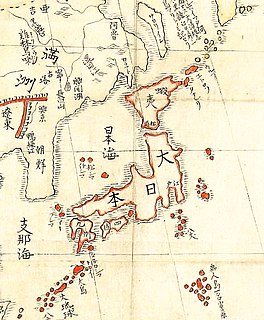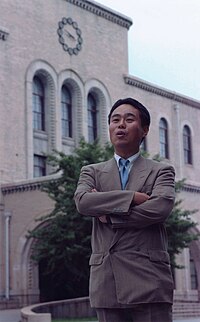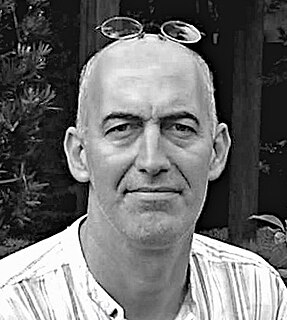
Frederick Seitz was an American physicist and a pioneer of solid state physics and lobbyist.

Kyoto University, or KyotoU, is a public research university located in Kyoto, Japan. Founded in 1897, it is one of the former Imperial Universities and the second oldest university in Japan. KyotoU is consistently ranked amongst the top two in Japan, the top ten in Asia, and the world's top fifty institutions of higher education.

Kyushu University, abbreviated to Kyudai, is a Japanese national university located in Fukuoka, on the island of Kyushu.

The Kyoto School is the name given to the Japanese philosophical movement centered at Kyoto University that assimilated Western philosophy and religious ideas and used them to reformulate religious and moral insights unique to the East Asian cultural tradition. However, it is also used to describe postwar scholars who have taught at the same university, been influenced by the foundational thinkers of Kyoto school philosophy, and who have developed distinctive theories of Japanese uniqueness. To disambiguate the term, therefore, thinkers and writers covered by this second sense appear under The Kyoto University Research Centre for the Cultural Sciences.

Penn State Dickinson Law, formerly Dickinson School of Law, is a public law school in Carlisle, Pennsylvania. It is one of two separately accredited law schools of The Pennsylvania State University. According to Penn State Dickinson Law's 2019 ABA-required disclosures, 95% of the Class of 2019 are employed nine months after graduation in positions that either require them to pass the bar or for which a J.D. degree is an advantage.
The Institute of Pacific Relations (IPR) was an international NGO established in 1925 to provide a forum for discussion of problems and relations between nations of the Pacific Rim. The International Secretariat, the center of most IPR activity over the years, consisted of professional staff members who recommended policy to the Pacific Council and administered the international program. The various national councils were responsible for national, regional and local programming. Most participants were members of the business and academic communities in their respective countries. Funding came largely from businesses and philanthropies, especially the Rockefeller Foundation. IPR international headquarters were in Honolulu until the early 1930s when they were moved to New York and the American Council emerged as the dominant national council.

Japan participated in World War I from 1914 to 1918 in an alliance with Entente Powers and played an important role in securing the sea lanes in the West Pacific and Indian Oceans against the Imperial German Navy as a member of the Allies. Politically, the Japanese Empire seized the opportunity to expand its sphere of influence in China, and to gain recognition as a great power in postwar geopolitics.
Southeast Asian studies (SEAS) refers to research and education on the language, culture, and history of the different states and ethnic groups of Southeast Asia. Some institutions refer to this discipline as ASEAN Studies since most of the countries that they study belong to the Association of Southeast Asian Nations or ASEAN. Definitions of what constitutes Southeast Asia differ between scholars, which blurs the boundaries between Southeast Asian studies and other regional studies like Oriental studies and post-colonial studies. Southeast Asian studies incorporates anthropology, religious studies, linguistics, and international relations.
David Murray Horner, is an Australian military historian and academic.

The University of Hawaiʻi Press is a university press that is part of the University of Hawaiʻi.

Kan Kimura is a Japanese scholar of political studies and area studies. He is now a professor at Graduate School of International Cooperation Studies, Kobe University, Japan.
Charnvit Kasetsiri is a Thai historian. He is a professor emeritus of the Thammasat University and was its rector in 1994–1995.
Peter Francis Kornicki FBA is an English Japanologist. He is Emeritus Professor of Japanese at Cambridge University and Emeritus Fellow of Robinson College, Cambridge.

Thongchai Winichakul, is a Thai historian and researcher of Southeast Asian studies. He is professor emeritus of Southeast Asian history at the University of Wisconsin–Madison and a chief senior researcher at the Japanese Institute of Developing Economies. He was the president for the Association for Asian Studies in 2013. He has had a major impact on the concept of Thai nationalism.
The University of Pennsylvania School of Arts and Sciences is the academic institution encompassing the humanities, social sciences, and natural sciences at the University of Pennsylvania.
John Whitney Hall, was an American historian of Japan who specialized in premodern Japanese history. His life work was recognized by the Japanese government, which awarded him the Order of the Sacred Treasure.

Harold Bolitho was an Australian academic, historian, author and professor emeritus in the Department of East Asian Languages and Civilizations at Harvard University. The name Bolitho is of Cornish origin.

Ōura Kanetake was a politician and bureaucrat in late Meiji and early Taishō period Empire of Japan. In 1907, he was raised to the rank and title of danshaku (baron) under the kazoku peerage system.

Kenneth Lewis Kraft was a professor of Buddhist studies and Japanese religions (emeritus) at Lehigh University in Bethlehem, Pennsylvania.

Rotem Kowner is an Israeli historian and psychologist specializing in the history of modern Japan, and a full professor in the Department of Asian Studies at the University of Haifa.













